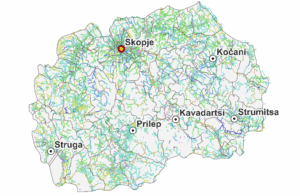Technical Assistance for Development of Sustainable Urban Mobility Plans for five Municipalities and providing training on developing and implementation of Sustainable Urban Mobility Plans

North Macedonia faces significant challenges in managing its extensive local road network, which spans approximately 9,000 kilometers and falls under the jurisdiction of decentralized municipalities. Many of these municipalities lack the capacity and resources necessary for effective infrastructure maintenance, resulting in deteriorating road conditions that limit access to essential services and opportunities, ultimately affecting citizens’ quality of life. Developing a well-structured Sustainable Urban Mobility Plan (SUMP) is crucial to addressing these challenges and achieving the aforementioned objectives.
The primary objective of this project, financed by the International Bank for Reconstruction and Development – World Bank, is to develop the SUMPs for the municipalities of Kavadarci, Kochani, Struga, Strumica, and Prilep by enhancing accessibility, promoting health and safety, supporting economic growth, and mitigating environmental impacts. This will be achieved through the promotion of sustainable transport modes, and the adoption of low-carbon initiatives aimed at reducing emissions and optimizing traffic flow.

The SUMP development process aligns with European guidelines and is divided into two macro-activities:
- Activity 1 involves setting up a working structure, engaging stakeholders, and developing plans for each municipality, focusing on analyzing the current state of mobility, formulating a strategy, planning measures, and preparing the SUMP. The methodology includes public consultations, stakeholder engagement, and the development of strategic indicators. The quantitative assessment tool, MOMOS, will be used to simulate the impacts of different mobility transition scenarios based on policy measures.
- Activity 2 includes providing training on SUMP development and implementation specifically for decision-makers and technical staff. Additionally, a Community of Practice will be established to promote knowledge exchange and raise awareness about sustainable urban mobility planning through annual events.
